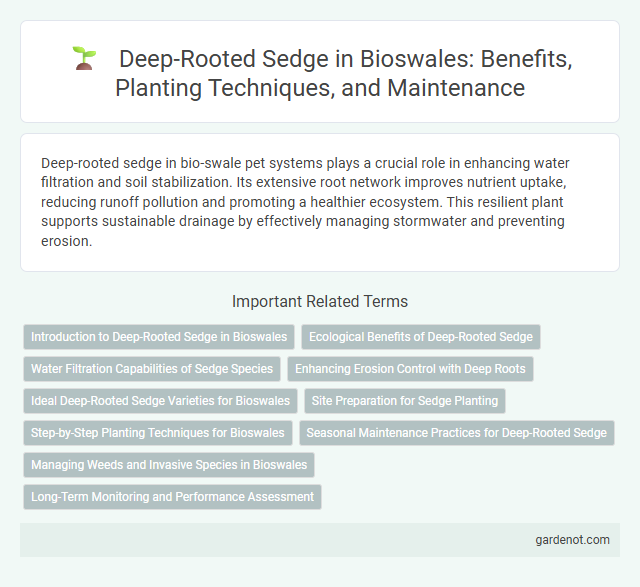Deep-rooted sedge in bio-swale pet systems plays a crucial role in enhancing water filtration and soil stabilization. Its extensive root network improves nutrient uptake, reducing runoff pollution and promoting a healthier ecosystem. This resilient plant supports sustainable drainage by effectively managing stormwater and preventing erosion.
Introduction to Deep-Rooted Sedge in Bioswales
Deep-rooted sedge (Carex spp.) plays a crucial role in bioswales by enhancing water infiltration and stabilizing soil through its extensive root system. Its deep roots improve groundwater recharge and reduce surface runoff, contributing to effective stormwater management. This native plant also supports habitat diversity and filters pollutants, making it an essential component in sustainable urban landscapes.
Ecological Benefits of Deep-Rooted Sedge
Deep-rooted sedge enhances bio-swale performance by stabilizing soil and promoting water infiltration, which reduces surface runoff and erosion. Its extensive root system supports microbial activity, improving soil health and nutrient cycling crucial for sustainable stormwater management. By filtering pollutants and maintaining habitat diversity, deep-rooted sedge contributes significantly to ecological resilience within urban green infrastructure.
Water Filtration Capabilities of Sedge Species
Deep-rooted sedge species play a crucial role in bio-swale water filtration by efficiently absorbing and filtering pollutants from stormwater runoff. Their extensive root systems enhance soil permeability, promoting infiltration and reducing surface water contaminants such as heavy metals and nutrients. Research highlights that sedges like Carex spp. significantly improve sediment retention and nutrient uptake, making them ideal for sustainable stormwater management in urban environments.
Enhancing Erosion Control with Deep Roots
Deep-rooted sedge plays a crucial role in enhancing erosion control by stabilizing soil with its extensive root system. These deep roots penetrate the subsurface layers, reducing surface runoff and increasing water infiltration in bio-swales. The plant's robust root network also promotes sediment retention, making it an effective choice for sustainable stormwater management.
Ideal Deep-Rooted Sedge Varieties for Bioswales
Ideal deep-rooted sedge varieties for bioswales include Carex stricta (Tussock Sedge), Carex vulpinoidea (Fox Sedge), and Carex appalachica (Appalachian Sedge), known for their extensive root systems that enhance soil stability and promote effective stormwater infiltration. These species thrive in wet, variable moisture conditions, making them optimal for controlling erosion and filtering pollutants in bioswale environments. Their adaptability to fluctuating water levels supports biodiversity and contributes to sustainable urban water management.
Site Preparation for Sedge Planting
Site preparation for deep-rooted sedge planting involves thorough soil assessment and amendment to ensure adequate drainage and nutrient availability. Removing existing vegetation and loosening compacted soil enhances root penetration and water infiltration in bio-swale environments. Incorporating organic matter and maintaining appropriate moisture levels before planting optimizes sedge establishment and long-term growth.
Step-by-Step Planting Techniques for Bioswales
Deep-rooted sedge enhances bioswale performance by stabilizing soil and improving water infiltration through its extensive root system. Begin planting by preparing a well-drained soil base enriched with organic matter, ensuring optimal root growth conditions. Space sedge plugs approximately 12 inches apart to promote dense coverage, and water consistently during establishment to support deep root development critical for effective stormwater management.
Seasonal Maintenance Practices for Deep-Rooted Sedge
Seasonal maintenance of deep-rooted sedge in bio-swales includes targeted pruning during late winter to remove old foliage and promote healthy regrowth. Regular inspection for invasive species and debris removal in spring ensures optimal water infiltration and nutrient uptake. Fall mulching around sedge roots enhances soil moisture retention and supports root development for the dormant season.
Managing Weeds and Invasive Species in Bioswales
Deep-rooted sedge plays a crucial role in managing weeds and invasive species in bioswales by stabilizing soil and outcompeting less desirable plants through its extensive root system. Its dense growth habit helps suppress invasive species establishment, reducing maintenance efforts and promoting native biodiversity. Implementing deep-rooted sedge enhances bioswale resilience, ensuring effective stormwater filtration and long-term ecosystem health.
Long-Term Monitoring and Performance Assessment
Deep-rooted sedge plays a critical role in bio-swale systems by enhancing soil infiltration and pollutant removal over time. Long-term monitoring reveals that this plant's extensive root network consistently improves water retention and reduces runoff pollutants such as heavy metals and nutrients. Performance assessment confirms that integrating deep-rooted sedge significantly increases bio-swale efficiency, ensuring sustainable stormwater management.
Deep-rooted sedge Infographic

 gardenot.com
gardenot.com